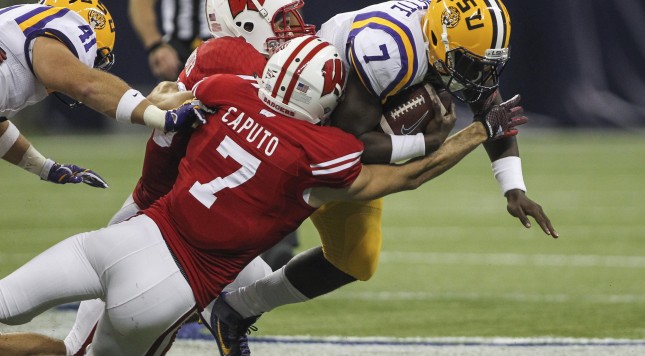As a friend of mine was listening to the radio Wednesday morning, he heard one of the talk show hosts ask the question, “How can you not have Leonard Fournette on your Heisman list?”
Naturally, this friend immediately sent me a text message asking me the same question, since he didn’t see Fournette’s name on my mock Heisman ballot, which included my top three choices for this coveted award.
Now, before I explain my reasoning on the subject, I want to make it absolutely clear that this isn’t a knock on Fournette as a player. The man is clearly one of the best running backs in the country, so much so that many college football experts are comparing him to other SEC legends such as Herschel Walker. The fact that he’s in those type of conversations speaks volumes about how good he really is.
He certainly has the numbers to win college football’s highest honor. After six games, Fournette is still averaging over 200 yards per game, which — if it holds up — would make him just the fourth player in history to accomplish that feat. He’s also averaging 8 yards per carry, and leads the nation in second-down rushing, running for 572 yards on 58 carries (9.86 ypc), with 32 of those runs resulting in a first down.
It tough to argue with those results.
Yet, I’m not ready to say that he’s the most outstanding player in college football.
Let’s be honest: while these numbers are impressive, they don’t quite tell the entire story. As explosive as Fournette is, he’s not irreplaceable. Sure, the Tiger offense isn’t as effective without him in the lineup, but it doesn’t exactly fall apart either. After all, the LSU offensive line is arguably the best in the country, helping Bayou Bengal running backs run for an average of 6.97 yards per carry – the third-highest total in the nation. Their excellence at the point of attack has helped top backups Derrius Guice and Darrel Williams run for 8.65 and 5.56 yards per carry.
In other words, it doesn’t matter who the tailback is, LSU is going to move the football.
The same can’t be said for some of the other Heisman Trophy top contenders. Take Utah’s Devontae Booker, for example. The nation’s 10th-leading rusher, Booker averages 130.5 yards per game and 4.86 yards per carry. His backup, Joe Williams, has run for just 3.64 yards per carry in limited action this season.
In addition, Booker is responsible for 27 of the team’s 34 runs of 10 or more yards this season, making him the team’s lone home-run threat in the ground game.
When viewed in that context, which player means more to this team, Booker or Fournette? Shouldn’t the nation’s most outstanding player be the most irreplaceable person on his team?
Even if the answer to that question is “no,” Fournette still isn’t the top running back in the country as far as statistics are concerned. Sure his numbers are absolutely awesome, but let’s compare with them with Florida State’s Dalvin Cook. At the midway point of the season, Cook has run for 955 yards and an average of 8.68 yards per carry. He’s also been a reliable pass receiver for the ‘Noles this season, catching 11 passes for 131 yards and a touchdown. More importantly, he’s been one of college football’s most explosive players, ranking third nationally with 16 plays of 20 yards or more.
Aside from rushing yards per game (200.33 for Fournette versus 159.13 for Cook), Cook beats Fournette in every other category, despite getting 40 fewer touches this season.
Perhaps, Dabo Swinney was on to something.
Yet, if you listened to most media outlets – especially that one in Bristol, Connecticut – you’d think that the Heisman Trophy should be Fournette, Fournette, Fournette, and then everyone else. However, as the details above point out, that absolutely shouldn’t be the case, since there are running backs that either mean more to their team or have posted better numbers with fewer opportunities.
That hardly sounds like a one-sided race to me.

